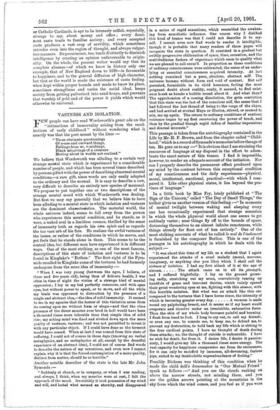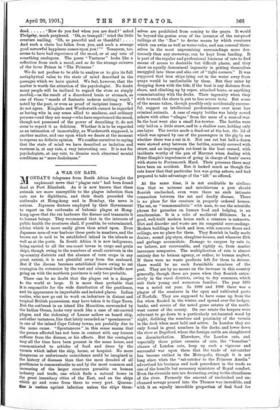VASTNESS AND ISOLATION.
FEW people can have read Wordsworth's great ode on the " intimations of immortality arising from the recol- lections of early childhood " without wondering what it exactly was that the poet meant by the lines :— " Those obstinate questionings Of sense and outward things, Fallings from us, vsnishings, Blank missivings of a creature Moving about in worlds not realised."
We believe that Wordsworth was alluding to a certain very strange mental state which is experienced by a considerable number of people, and which has been several times described by persons gifted with the power of describing abnormal mental
conditions,—a rare gift, since words are only easily adapted to the ordinary and the normal. It is easy to describe a cow, very difficult to describe an entirely new species of mammal. We propose to put together one or two descriptions of the strange mental mood with which Wordsworth was dealing. But first we may say generally that we believe him to have been alluding to a mental state in which isolation and vastness are the dominant characteristics. The material world, the whole universe indeed, seems to fall away from the person who experiences this mental condition, and he stands, as it were, a naked soul in a limitless cosmos, thrilled by the sense of immensity both as regards his own spirit and as regards the too vast orb of his fate. He realises the awful vastness of the issues, or rather of the conditions in which he moves, and yet feels that he stands alone in them. This seems to be the central idea, but different men have experienced it in different ways. One of the most striking, as one of the most famous, descriptions of this state of isolation and vastness is to be found in Kinglake's " Eothen." The first sight of the Pyra- mids recalled to King]ake some of the tortures he had formerly undergone from the mere idea of immensity :—
" When I was very young (between the ages, I believe, of three and five years old), being then of delicate health, I was often in time of night the victim of a strange kind of mental oppression ; I lay in my bed perfectly conscious, and with open eyes, but without power to speak, or to move, and all the while my brain was oppressed to distraction by the presence of a single and abstract idea,—the idea of solid immensity. It seemed to me in my agonies that the horror of this visitation arose from its coming upon me without form or shape—and that the close presence of the direst monster ever bred in hell would have been a thousand times more tolerable than that simple idea of solid size; my aching mind was fixed and riveted down upon the mere quality of vastness, vastness; and was not permitted to invest it with any particular object. If I could have done so the torment would have ceased. When at last I was roused from this state of suffering, I could not of course in those days (knowing no verbal metaphysics, and no metaphysics at all, except by the dreadful experience of an abstract idea), I could not of course find words to describe the nature of my sensations, and even now I cannot explain why it is that the forced contemplation of a mere quality, distinct from matter, should be so terrible."
Another notable describer of the state is the late Mr. John Symonds :- "Suddenly at church, or in company, or when I was reading, and always, I think, when my muscles were at rest, I felt the approach of the mood. Irresistibly it took possession of my mind and will, and lasted what seemed an eternity, and disappeared in a series of rapid sensations, which resembled the awaken- ing from ant:esthetic influence. One reason why I disliked this kind of trance was that I could not describe it to my- self. I cannot even now find words to render it intelligible, though it is probable that many readers of these pages will recognise the state in question. It consisted in a gradual but swiftly progressive obliteration of space, time, sensation, and the multitudinous factors of experience which seem to qualify what we are pleased to call ourse'f. In proportion as these conditions of ordinary consciousness were subtracted, the sense of an under- lying or essential consciousness acquired intensity. At last nothing remained but a pure, absolute, abstract self. The universe became without form and void of content. But self persisted, formidable in its vivid keenness, feeling the most poignant doubt about reality, ready, it seemed, to find exist- ence bleak as breaks a bubble round about it. And what then ? The apprehension of a coming dissolution, the grim conviction that this state was the last of the conscious self, the sense that I had followed the last thread of being to the verge of the abyss, and had arrived at eternal Maya or illusion, stirred, or seemed to stir, me up again. The return to ordinary conditions of sentient existence began by my first recovering the power of touch, and then by the gradual though rapid influx of familiar impressions and diurnal interests."
This passage is taken from the autobiography contained in, the Life by Mr. H. F. Brown, and from the chapter called " Child- hood," which is a record of Symonds's memories before the age of ten. He goes on to say :—" It is obvious that I am straining the resources of language at my disposal in the effort to adum- brate the exact nature of this trance. I find it impossible, however, to render an adequate account of the initiation. Nor
can I properly describe the permanent effect produced upon my mind by the contrast between this exceptional condition of my consciousness and the daily experiences—physical, moral, intellectual, emotional, practical—with which I com• pared it. Like other physical states, it lies beyond the pro- vince of language."
In a little book by Miss Fry, lately published at " The Sign of the Unicorn," called " The Day of Small Things," the author gives usanother version of this feeling :—" In momenta of mental twilight between waking and sleeping every one has occasionally experienced that strange sensation in which the whole physical world about one seems to get suddenly vaster; near things fly off to the bounds of space, distancing themselves to an almost infinite remoteness, while things already far float out of ken entirely." One of the most striking accounts of what he called le mal de l'isolement is furnished by the composer Berlioz. This is one of the passages in his autobiography in which he deals with the subject :— " It was about this time of my life as a student that I again experienced the attacks of a cruel malady (moral, nervous, imaginary, or anything else you like) which I shall call the sickness of isolation. I had my first attack of it at the age of
sixteen The attack came on in all its /strength, and I suffered frightfully. I lay on the ground groan- ing sadly, stretching out my arms, convulsively tearing up handfuls of grass and innocent daisies, which vainly opened their great wondering eyes at me, lighting with this absence, with this horrible isolation. But what was an attack like this one compared to the tortures that I have borne since, the intensity of
which is becoming greater every day A vacuum is made round my palpitating breast, and it seems as if my heart would evaporate and dissolve under an irresistible, exhaustive force. Then the skin of my whole body becomes painful and burning. I flush from head to foot. I long to cry out, to call my friends, or even any one, to console me, to keep me, to defend me, to prevent my destruction, to hold back my life which is ebbing to the four cardinal points. I have no thought of death during these attacks ; no, the thought of suicide is unbearable. I have no wish for death, far from it. I desire life, I desire it passion- ately, I would give my life a thousand times more energy. The vast capacity for happiness exasperates me from its uselessness, for it can only be satisfied by immense, all-devouring, furious joys, suited to my incalculable superabundance of feeling."
Possibly Dickens was thinking of this condition when he made the child doll's dressmaker in " Our Mutual Friend " speak as follows :—" And you see the clouds rushing on above the narrow streets, not minding them, and you see the golden arrows pointing at the mountains in the sky from which the wind comes, and you feel as if you were
dead. 'How do you feel when you are dead ? ' asked Fledgeby, much perplexed. Oh, so tranquil!' cried the little creature smiling. Oh, so peaceful and so thankful And such a chain has fallen from you, and such a strange good sorrowful happiness comes upon you!'" Tennyson, too, seems to have had experience of the mood, or at any rate of something analogous. The poem " Vastness " looks like a reflection from such a mood, and so do the strange seizures of the lover Prince in " The Princess."
We do not profess to be able to analyse or to give its full metaphysical value to the state of mind described in the passages which we have quoted. We feel, however, that the matter is worth the attention of the psychologist. No doubt many people will be inclined to regard the state as simply morbid,—as the result of a disordered brain or stomach, as one of those " moods of fantastic sadness nothing worth " noted by the poet, or even as proof of incipient lunacy. We do not agree. Kinglake and Wordsworth cannot be regarded as having wits in any sense allied to madness, and ordinary persons—and they are many—who have experienced the mood, though not possessed of the power of describing it, do not seem to regard it as delirious. Whether it is to be regarded as an intimation of immortality, as Wordsworth supposed, is another matter, and one upon which we desire at the moment to express no definite opinion. We confine ourselves to saying that the state of mind we have described as isolation and vastness is, at any rate, a very interesting one. It is not for psychologists, at any rate, to dismiss such abnormal mental conditions as "mere foolishness."







































 Previous page
Previous page